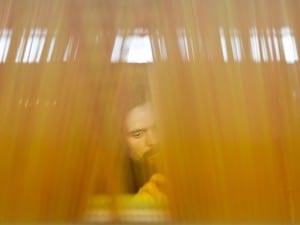Amir Nizar Zuabi’s new play explores what it means to live through a significant historical event, emphasising the importance of the personal over the political.
1948. The year of the Arab-Israeli War, or al-Nakba (the Catastrophe); the year that the British Mandate of Palestine was officially terminated and the State of Israel declared. The events of this year and their consequences still resonate throughout the Middle East today, imbued with such historical significance that they are in danger of becoming clichéd. With endless news coverage, debates and reports around the subject, it is easy to forget about the daily lives of the individuals who lived through these times, whose everyday concerns and joys are rendered seemingly inconsequential in the shadow of political events that have had such far-flung consequences. Amir Nizar Zuabi’s new play attempts to redress this imbalance, searching for the personal amidst a cacophony of politics.
I Am Yusuf and This Is My Brother is set in Palestine amidst the volatile and changing landscape of January 1948. The play unfolds over a backdrop of war and displacement, but it is neither of these events that provide the main drama. Zuabi’s play focuses instead on the prohibited relationship between two young Palestinians, Ali and Nada. Ali has a burning passion for Nada, but is in despair because her father will not let them marry. For Amir Nizar Zuabi it is the personal that holds the real story of 1948: “A story encompassing the fear for loved ones and the images one sees before he walks out of his house for the last time – under this staircase my wife told me she was pregnant – on this table my son cracked open his chin.”
It is this desire to expose history from a human perspective that led to the creation of the play’s protagonist. The unfolding events are told from the eccentric, child-like viewpoint of Ali’s disabled brother Yusuf, whom Zuabi describes as being “like the Biblical Joseph”. He is “pure” and as such is able to observe events without judgement, but rather with the simple understanding that everyone is a victim of their circumstances. Even Rufus, a soldier on the occupying British forces, is portrayed with empathy as he yearns for the cold fogs of Sheffield; he too has experienced loss.
Zuabi wants his audience to identify with the pain of each character and to understand them as individuals rather than as representatives of a culture or a political position. Whilst Rufus is a part of the British Mandate and thus one of the catalysts in the 1948 war, he is also just a man who is homesick. Zuabi captures those common experiences that exist regardless of political affiliation or cultural understanding; those ordinary, everyday fears and hopes that link us in our universal humanity and that we can all relate to. He explains: “With regards to Rufus, I tried to write him as honestly as I could. In 2003, I spent a year in London and I found myself homesick, and more than anything, sunsick. Rufus was born out of that experience.”
It is important for Zuabi that Yusuf’s observations of 1948 should be unclouded by cultural preconceptions and moral judgements, as he is aware that the events of 1948 have come to define Palestine and he is eager to steer away from cultural platitudes. This doesn’t mean that his play isn’t political, it would be impossible for it not to be given the subject matter, but as Zuabi points out: “A small play about a man and a woman is just as political as a play about South Africa under the apartheid regime or Palestine under occupation.” If politics is really about the intricacies of social relations and power balance, then it exists in even the most mundane of human interactions. The important thing is how it is handled; Zuabi stresses that “good political theatre does not tell you what to think; that’s propaganda. Good political theatre asks questions.”
Through I Am Yusuf, Zuabi seeks to create a dialogue that cuts across barriers of geography, culture and language and speaks to the shared humanity at the heart of his audience. This is an ambition shared by the theatre company that will be performing the play; led by Zuabi, Shiber-Hur are a vibrant young theatre group from Galilee. The phrase Shiber-Hur means “within an inch of freedom” and the goal of the group is to “create a cultural space that would allow us to understand who we are and what the issues are that concern us.” Comprised of Palestinian actors living within Israel, Shiber-Hur is a touring group, something that Zuabi explains as a necessity if they wish to showcase their work: “The reality of the political, social and cultural situation in Palestine means that we have to tour our shows and seek out our audience because most of the time our audience can’t come to us.”
The cultural heritage of Palestine is rooted in poetry, with poets such as the late Mahmoud Darwish achieving national hero status, and less in the performing arts: “Theatre in Palestine is a new art form.” Zuabi believes that this “lack of tradition is an advantage as much as it is a disadvantage; it gives you the freedom to do things differently.” Here Shiber-Hur can create their own style of theatre without the expectations that can accompany theatrical productions in the West. This freedom applies to the writing as well; there are a distinct lack of plays being written in Palestine and it was this absence of contemporary material that led Amir Nizar Zuabi to create I Am Yusuf. He explains: “In Palestine one might find he has to write if he wants to deal with certain issues.”
I Am Yusuf and This Is My Brother is the first play that Zuabi has written and signals a new direction. He is already well-established as a director, with recent works including Samson and Delilah (Flanders Opera, Antwerp) and a dramatisation of Jidarriya, an epic poem by Mahmoud Darwish (Edinburgh International Festival, Bouffes du Nord and international tour). He is no stranger to the Young Vic either, as one of their international associates, his production of Alive From Palestine played an extended run to a packed house in 2002 and he will be directing I Am Yusuf there in January 2010.
Zuabi has found new challenges in directing a play that he wrote. He talks of the difficulty in having a reaction against something you yourself have created: “A lot of the time, I’d said what I wanted to in the act of writing, and as a director I had to find a way of rephrasing what I’d already said to find a new meaning.” The direction has helped his writing to grow though, with the play maturing and adapting with each production. He speaks of developing a “natural appetite for writing” and states his desire to be considered “both a writer and director in the future.”
I Am Yusuf and This Is My Brother is currently touring around various cities and villages in what is now Israel and the Occupied Palestinian Territories, including Hebron, Jaffa and Nazareth. Given the unfamiliarity of the populace with the medium of theatre in certain areas that they visit, it is very rewarding when an audience enjoys the play: “Knowing that the audience is composed from first-time theatregoers, from people that are here because they want to be, not because it is cultural to do so, leaves one with a distinct feeling of acheivement. We are working very hard to create new audiences here and I hope our audience will become more and more interested in theatre.” Zuabi hopes that the work of Shiber-Hur will inspire other companies and encourage the growth of theatre in Palestine.
Despite their success with the Palestinian audiences, the play has yet to be performed in front of a Jewish Israeli audience. The subject of al-Nakba is considered “taboo” in Israel and a reluctance to discuss the events of 1948 will make it difficult, if not impossible for the company to organise a show for this audience. However, this does not mean that Amir Nizar Zuabi is not willing to try: “I do hope we will find a brave partner in the Israeli side that will make it possible.”
I Am Yusuf and This Is My Brother was directed by Amir Nizar Zuabi, with design by Jon Bausor and light by Colin Grenfell. It ran from 19 January – 6 February 2010 at the Young Vic, London. www.youngvic.org.
Bryony Byrne





